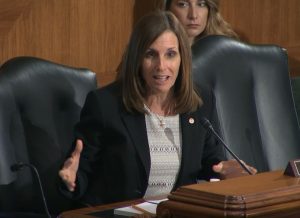
U.S. Sen. Martha McSally (R-AZ) recently sought solutions from data experts on how to help bring transparency to the collection of American consumers’ online data during a U.S. Senate Banking, Housing, and Urban Affairs Committee hearing.
“If the solution isn’t data as private property, what is it? I’m not one who wants a government solution that’s going to stop innovation. We want less regulations and more innovation but, in this case, how do we deal with that conflict and what’s the best place to start. Is it transparency?” Sen. McSally asked during the Oct. 24 hearing entitled “Data Ownership: Exploring Implications for Data Privacy Rights and Data Valuation.”
Witnesses during the hearing joined lawmakers in examining data ownership and exploring its implications for data privacy rights and data valuations. Sen. McSally pushed for a solution that would provide power to Americans over the online data that’s collected about them.
“Part of what’s happening I think culturally is we’ve got all these new tools that are out there that people are able to use for free, and their revenue model is to collect your data and sell it,” she said. “I mean we all know that, and maybe unwillingly people did it initially but now that’s kind of our expectation — that we can do a free internet search, get free social media contacts and communication. But it’s not free.”
The witnesses at the hearing were Jeffrey Ritter, founding chair of the American Bar Association Committee on Cyberspace Law; Chad Marlow, senior advocacy and policy counsel at the American Civil Liberties Union; Will Rinehart, director of technology and innovation policy at the American Action Forum; and Michelle Dennedy, chief executive officer at DrumWave Inc.
“You guys are all saying it’s not data as private property. Then what is it?” Sen. McSally said.
Ritter responded that transparency is a critical component.
“What we’re seeing in the way we manage data as property is increased detail, increased capability of monitoring detail, and that also enables us to have more rapid response in both corporate systems and government systems, and information security allows us to see what’s happening,” he said. “Transparency is good.”



